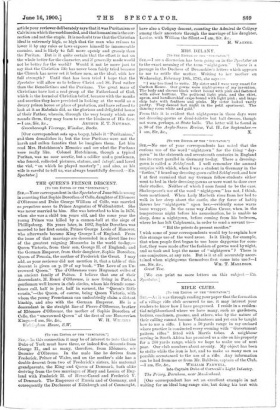[To THE EDITOR OF THE "SPECTATOR.")
Sra.,—No one of your correspondents has noted that the curious use of the word " nightgown " for the thing " day- gown " in the sixteenth and seventeenth centuries in England has its exact parallel in Germany to-day. There a dressing. gown is called a Schlaf-rock. I well remember the amused surprise with which, when I was a student in Germany in the "forties," I heard my dressing-gown called Schlaf-rock, and how I at first surmised that my German fellow-students either went to bed in their dressing-gowns or were wont to doze over their studies. Neither of which I soon found to be the case. Shakespeare's use of the word "nightgown" has not, I think, been mentioned. When Lady Macbeth rises from her bed to walk in her sleep about the castle, she (by force of habit) throws her " nightgown " upon her,—evidently some warm loose wrapper. In the same way Julius Ccesar, when, in the tempestuous night before his assassination, he is unable to sleep, dons a nightgown, before coming from his bedroom, where he has left Calphiunia, in order to send a servant to- " Bid the priests do present sacrifice."
wish some of your correspondents would try to explain how this strange use of the word arose. Is it likely, for example, that when people first began to use loose daygowns for com- fort, they were made after the fashion of gowns used by night, and so took and kept the name of " nightgown " ? There is one conjecture, at any rate. But is it at all accurately ascer- tained when nightgowns themselves first came into use P—I [We can print no more letters on this subject.—En. Spectator.]






































 Previous page
Previous page